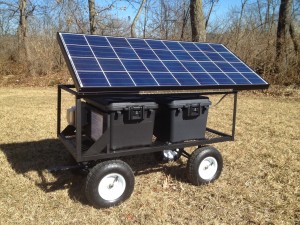 Graeme Smith was mulling over a long-standing problem at the end of 2015: how to provide affordable power to his tiny, off-grid community.
Graeme Smith was mulling over a long-standing problem at the end of 2015: how to provide affordable power to his tiny, off-grid community.
Despite having freehold title to 170 square kilometres of land east of Tennant Creek and plenty of money in the bank, members of the Munungurra Aboriginal Corporation could not afford to live on their country as reported by ABC News.
The cost of providing power to such a remote location prevented them building an economy on their land.
“We originally had no power and no water, because we’re not on a grid. We put houses on it, we put generators on it. But still that wasn’t enough,” said Mr Smith, the corporation’s chief executive.
The corporation paid for two diesel generators to run power to two small communities, where two out of eight houses were permanently occupied.
“Whilst it gave people reliable power with two houses pulling off a generator, we’d be going through $600 to $700 a week in diesel,” he said.
“Because we have no employment on community, people weren’t able to pay for the diesel”.
So on Mr Smith’s initiative, Munungurra Aboriginal Corporation leased a solar power system at a cost of more than $200,000 from Indigenous Business Australia (IBA), and switched off its diesel generator.
IBA is a government-funded organisation that promotes economic independence for Aboriginal and Torres Strait Islander people.
Solar change brings economic, social benefits
In the space of three months, the community’s power bill dropped by more than half, the population grew from three to 40, and local jobs and a school sprang up.
With the promise of cheaper power, the community transformed.
“With solar and with [population] numbers we were able to get services. We’ve got School of the Air now because we’ve got 15 kids,” Mr Smith said.
The increased size of the community has generated jobs as well.
Munungurra Aboriginal Corporation won two government contracts — one to provide housing repairs and maintenance, and another running Work for the Dole programs.
Mr McInnes believes Munungurra’s experience will be replicated.
“After one we will do two, three, four [communities], he said. “There’s opportunities for very similar outcomes for remote communities that are reliant on diesel — it’s about saving money.” To read more click here.




